Photoblogging Ethiopia
One of the first things to strike a new visitor to Ethiopia is the pervasiveness of English. All the street signs, and the vast majority of billboards and storefront signs, are either in English only or in English and Amharic.
I asked about this and was told that, shortly after the Second World War, Emperor Haile Selassie ordered that English become the medium of instruction in all Ethiopian high schools. Since some 40 percent of the population attends at least some high school, learning English is common enough that it seems everyone understands it. After 60 years, the teaching and learning of English is embedded in Ethiopian life.
This has proved useful in uniting a country with about a dozen major ethnic groups, countless sub-groups and clans, and at least 45 major spoken languages and dialects (including Amharic, Tigrinya, Somali, and Oromo, to name just four). Government documents are issued in both Amharic and English, and sometimes in other vernacular languages, as well. Television news is broadcast in English. English-language newspapers report on local and world affairs. And this in a country that was never colonized by either Britain or the United States!
Here are some photographs I took while I was in Ethiopia earlier this month. Mind you, I was on a business trip, so sightseeing was not on the agenda. Consequently, most pictures I took were from my hotel room balcony, except for a few that I took while on Entoto, the 10,000-foot-above-sea-level mountain overlooking the 7,200-foot-above-sea-level plain where Addis Ababa is located. We had a few hours free one afternoon, and we were taken to see the two oldest churches in Addis Ababa.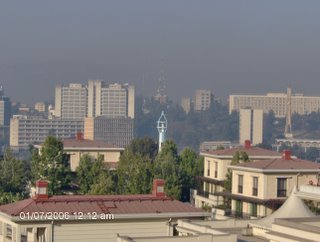
Upon waking up in Addis Ababa (and other African cities, for that matter), one immediately notices the acrid odor in the air. This comes from wood-burning fires that people use to cook their breakfasts. A heavy smog hangs over the city in the morning hours, but it dissipates during the late morning and afternoon, only to return in the evening as families cook their suppers. (In the middle distance, you can see the blue tower of a mosque.)
In Addis, the smoke takes on an added aroma in that it comes from the burning of blue eucalyptus, a non-native species of tree that was imported to provide firewood in the barren plateau. Today you can see old women coming down the mountain carrying heavy stacks of branches, more than twice as tall as the women themselves, to sell as firewood in the city. The lucky ones have donkeys but most of them use their own muscles and bent spines to do the job.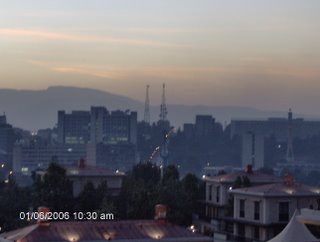
This view, from the same vantage point but a slightly different angle, shows the evening smog hanging over Addis Ababa.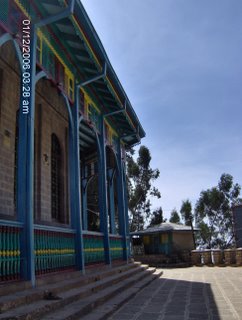
Ethiopian history stretches back at least 3,000 years, so one might suppose that the capital city, Addis Ababa, is nearly that old. Not so -- it was founded only in 1886, about the same time as Johannesburg, South Africa.
King (later Emperor) Menelik II moved his court to Entoto, a mountain base in the center of Shoa (the region of central Ethiopia where Addis now is). A small city grew up along the road between two Ethiopian Orthodox churches.
Queen (later Empress) Taitu, however, did not like the cold weather in the mountains. She moved her camp to the side of a hot spring on the plain below. She sent a message to her husband that said, essentially, "If you ever want to get some from me again, you had better move here." So he did, taking his whole court down the mountain and establishing the city now known as Addis Ababa.
What you see above is the oldest church in Addis, only a bit over a 100 years old despite the culture's 3,000-year track record.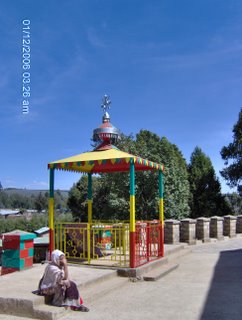
Besides Armenia, Ethiopia may be the oldest Christian nation in the world. (There are now a large number of Muslims in the country, too, but for centuries it was officially Christian in the sense that Russia and Greece are.)
There are differences, however, between Ethiopian Orthodoxy and other Orthodox and Latin churches. For one thing, the Ethiopian Orthodox Church is monophysite -- that is, it rejects the doctrine, adopted at the Council of Chalcedon, of the "dual nature " of Christ. That is, whereas other Christian churches believe that Jesus Christ is "fully human and fully divine," the Ethiopian Orthodox believe that he is only fully divine.
Another difference: Ethiopian Orthodox Christians adhere to Old Testament dietary restrictions. So there were no pork products available in any of the restaurants at the Sheraton Addis Hotel, explaining why I had my first taste of "veal bacon."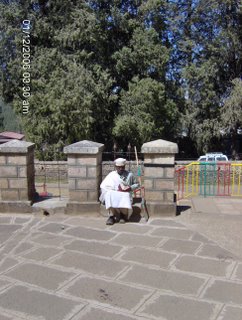
This deacon was studying his prayer book in the sunshine outside the church.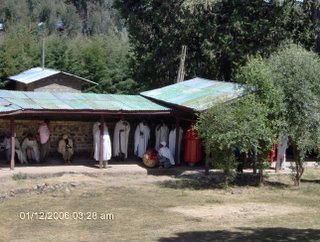
Meanwhile, some priests and deacons were conducting a service of some sort (it might have been a funeral) at the base of the church, not inside it.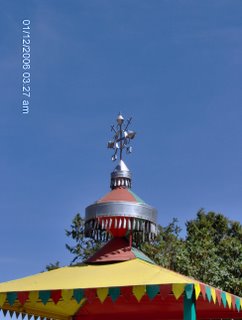

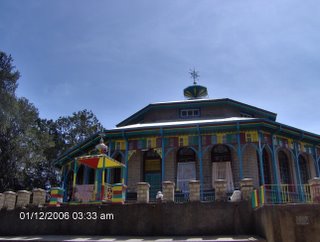
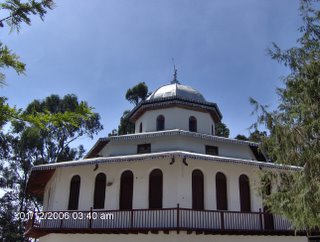
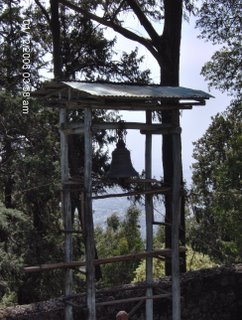

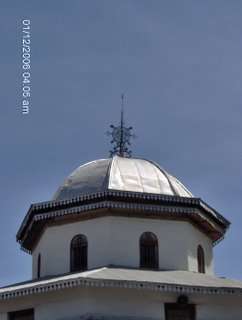
Finally, for those of you who have been wondering what happened to all those ubiquitous red telephone booths in Britain, after British Telecom decided to get rid of them, at least some of them landed in Ethiopia, where they are still used by the many people unable to afford cellphone service: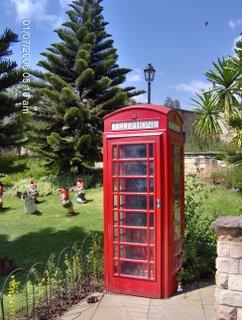
If you are interested in learning more about the history of Ethiopia, I recommend a book by retired U.S. diplomat Paul Henze called Layers of Time: A History of Ethiopia. I bought a copy just before I left the country and read it on the plane on the way home, answering a lot of the questions that had come to mind during my stay.



1 comment:
An interesting entry...But English is really not as pervasive as you think in Ethiopia (maybe being an expatriate, the crowd you keep makes it seem that way). The evening news is for expat and almost no one local listens to it, people just stay up to watch the movies after the English news.
You are right; English is used as a medium of education in high schools. But if you attended one of those classes you would find people communicated in Amharic even in those classes(in Addis). Scientific terms, of course, you have to learn in English. I remember that my 9th grade English teacher spoke more Amharic than English in class.
Finally you are right Ethiopia was never a colony. We hope it stays that way too [more on this on our blog if interested].
I couldn't believe the telephone booth picture was taken in Ethiopia.
Take care!
Post a Comment